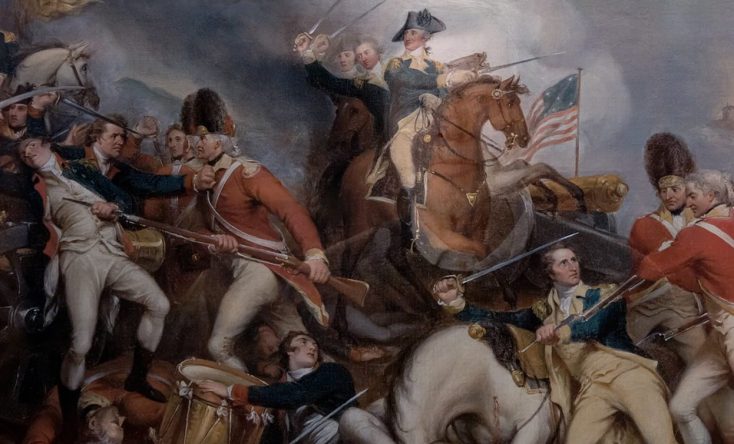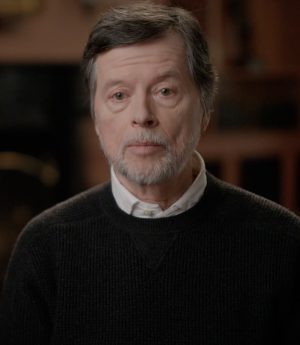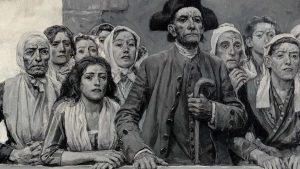By JUDY SLOANE
Front Row Features
HOLLYWOOD-Ken Burns is perhaps the most prolific and successful documentarian in the world. For years the producer/director has engaged the public with his films on “The Civil War” (1990,) The Roosevelts” (2014,) and “The Vietnam War” (2017.)
He now has produced and directed another stunning look at America with his six-part, 12-hour documentary “The American Revolution,” which premieres on PBS on November 16, 2025, look for local listings for times, examining how America’s founding turned the world upside-down.
Burns spoke with TV journalists about his newest achievement.
Q: What surprised you most doing this project?
Ken Burns: We have seen our revolution in bloodless gallant myth, just guys in Philadelphia thinking great thoughts, and that’s a big part of the story.
This is a bloody revolution. I think the thing for me is just the sheer sense of how long it took, how bloody it was, how anybody involved in it didn’t know they were who they were. George Washington didn’t know he was going to be George Washington.
The sense of contingency and the idea that it might not turn out the way we know that it did was the surprising aspect for us to try to work into our work. It’s certainly the most consequential revolution. I think it’s the most important event since the birth of Christ.
Q: Thank you for opening our eyes to something that perhaps we’ve overlooked for years.
Ken Burns: I think we’ve all done that. And I think it has to do with no photographs, no newsreels and that kind of mythology that we think that if we really accept the violence of our revolution, that somehow it will diminish all those great ideas taking place in Philadelphia, the Declaration, and then a decade later, the Constitution. It doesn’t. It only makes those things even more remarkable in the scope of things.
And the fact that the people involved have no idea how it’s going to turn out, gives it a kind of urgency and, we hope, a freshness that allows everybody to join this. This is our story. It’s our creation story. And we should be enormously proud but not burdened by all the mythology that has attended to it up to this point.
Q: We are used to Ken Burns’ projects being expansive and exhaustive. Was six nights and 12 hours always the goalpost?
Ken Burns: Yeah, pretty early it got to be that. We knew that it wasn’t going to be Vietnam, 10 episodes and 18 hours, just because of the absence of that verifiable footage and still photographs. I think as we began, we were thinking more five episodes and then almost immediately realized what we had.
Q: What questions came up for you while you were shooting this?
Ken Burns: What would I have been? Would I have been a patriot or a loyalist? Could I have died for a cause? Remember at the end of the declaration, we pledge our lives, our fortunes, and our sacred honor.
George Washington’s one of the richest people in the country. He is definitely risking his life all the time and doesn’t need to in some instances. He’s rash, riding out on the battlefield to stop a retreat at Monmouth or to lead people on at Princeton or to stop a retreat at Kips Bay, where he could have been killed.
He’s basically in a tent, not at Mount Vernon, for most of the six and a half years of the war. And that’s an impressive thing. And the question of could you fight and die for a cause are all intertwined.
Q: This is a very wide-ranging portrait of George Washington. We see him make incredible mistakes, and doing incredibly smart things.
Ken Burns: That’s exactly right. As we all are, he’s a conflicted and complicated person and deeply flawed and makes rash decisions on the battlefield, risking his life and therefore the cause.
He makes two extraordinarily bad tactical maneuvers at the largest battle of the Revolution, Long Island, where he leaves his left flank exposed. And then the reason why we’re in Valley Forge and not in Philadelphia is because he does the same thing at a big battle, Brandywine, where he leaves the right flank. But saying that, he is the only person that could have kept everybody together.
Q: Why do you think that is?
Ken Burns: It’s a combination of personal probity and virtue, a kind of political savvy to be able to work with Congress, an ability to inspire people in the dead of night to fight. It’s also an ability to pick subordinate talent without fear of them overshadowing him. He’s really the one person you can say that about.
Q: Why is this coming out in November, when the 250th birthday is next year? Why not premiere it on a more significant date?
Ken Burns: There’s no reason. In fact, not having a significant date is super important, so it’s not a traffic jam. It’s not like trying to leave the city on Friday afternoon. When we were working on this, nobody was thinking about 250.
I realized how good it would be to come out in the fall, which is the traditional time when PBS shows our long, big footprint series. And also well in advance of the 4th of July. My great worry before I even knew there was going to be a 250-anything was that we would be drowned in fife and drum treacle, that we would go back to this romanticized thing.







